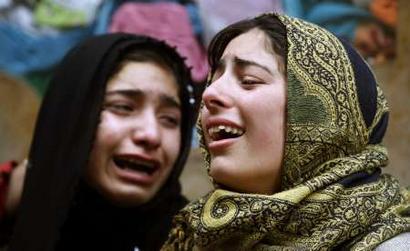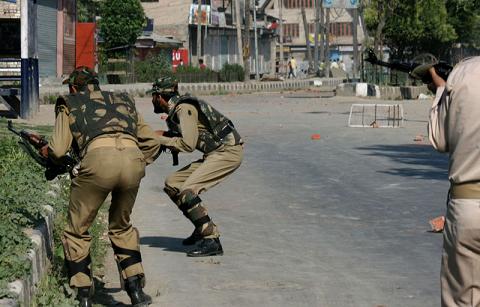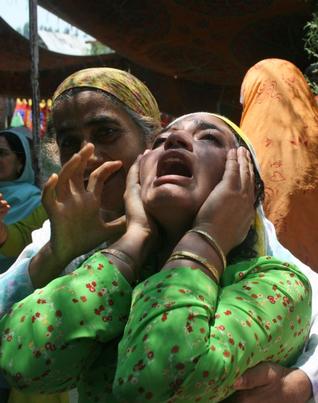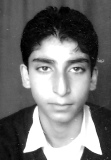While Indian Foreign Secretary Nirupama Rao had met with her Pakistani counterpart, Salman Basir, for talks last month, Kashmiris have been mourning the widespread murders of Kashmiri youth by state security forces, some 15 people this past month. The murders have sparked the largest civil protests by Kashmiris in the last two years in the Indian Administered Kashmir valley, nestled between India and Pakistan. "Everything is dead. The curfew has kept us in our homes for the last two weeks. No work, no bread, no milk, no school. More than five people have been killed in the last 24 hours," said sources speaking with me over the phone from Srinagar, Kashmir. Adding fuel to the fire, earlier this year it was revealed that Indian paramilitary forces were engaged in staging fake encounter killings by kidnapping Kashmiri civilians and reporting the murders of the civilians as armed encounters with foreign militants/terrorists. With a continuing lack of justice and accountability suffocating Kashmiri civil society, Kashmir may grow more vulnerable to falling under a resurgence of armed uprising and religious radicalization that currently plagues the region, namely in Afghanistan and Pakistan. Further instability and lawlessness in the region will marginalize the efforts of the United States and other nations who remain invested in the security and peace of the region. This article is not about religion, or politics, or who is right. This article is about the young teenagers who have been murdered this month and the 2,900 mass graves that have not been investigated or reported on. This article calls on all parties to fulfill the demands that Kashmiris themselves are making for justice and accountability.
WIDESPREAD KILLINGS OF YOUTH Reuters/Fayaz Kabil
Reuters/Fayaz Kabil
Several weeks ago, a 17 year old Kashmir student, Tufail Ahmad Matoo, was walking home amidst a routine and civil anti-India protest by Kashmiris in the embattled region of Indian Occupied Kashmir. He was carrying his books. Like many Kashmiri youth of today, Tufail grew up having to endure an environment of indiscriminant arrests and killings by state security forces as well as militants. Today, an entire generation of young Kashmiris like Tufail have grown up witnessing the murder of over 70,000 people and the kidnappings and disappearances of over 8,000 Kashmiris, since 1989. The actions of both Pakistani backed- militants and Indian Security Apparatuses have marginalized the rights and needs of the Kashmiri people. Yet Tufail, like most Kashmiri youth, was focusing on his studies as means of escape. Unfortunately, like thousands of young Kashmiri boys before him, Tufail's life was cut short when he was shot in the head by a rubber bullet from Indian security forces and police last month. The killing of Tufail sparked civil protests across the Kashmir valley for the last several weeks. Two more Kashmiri youth were murdered by state security forces during funeral processions and civil protests in the days following Tufail's murder last month. As recently as this week, three more innocent Kashmiris have been killed, including a 16 year old boy who was murdered when security forces opened fire on protesters at a funeral procession of a 17 year old boy murdered Tuesday.
Just days after the student, Tufail, was murdered by state security forces, Rafiq Bangroo, 25, was severely beaten by the Indian Administered Central Reserve Police Force, CRPF, during a protest against Tufail's murder. Rafiq succumbed to his injuries. One day later, during the funeral procession for Rafiq Bangroo, the deceased's neighbor, Javaid Malla, 20, was shot and killed by security forces. Once again, curfews and civil shutdowns have left schools and businesses closed and the valley at a stand still. Indian paramilitary and police forces have been opening fire on protesters and taking men and boys into custody. This past Monday, 17 year old Muzaffar Bhat disappeared after troops chased him and a group of young boys throwing stones. Muzzafar's body was found the next day and he was allegedley beaten to death. At the funeral procession for Muzaffar, a 16 year old boy, Abrar Khan, was murdered by police during mass civil protests against the alleged killings. Some 15 Kashmiri civilians have been killed by Indian security forces since June. Kashmiris are again locked down under the gun of security forces that operate brutally with impunity. The beatings and shoot-to-kill tactics of state security forces legalized under draconian security laws continue to marginalize the basic rights, (such as the to life and movement), of millions of women and children of Kashmir.
The murders of several Kashmiri youth this past month by security forces clearly exhibits the widespread and systematic practice of shoot-to-kill strategies conducted by the state security apparatuses of India. Soldiers and state security forces are able to use bullets to combat stones and slogans under the protection of Indian security legislation, such as the Armed Forces Special Powers Act, AFSPA, which grants Indian paramilitary and police forces license to detain, shoot, and torture at will with virtual protection from being prosecuted by civilian courts and international bodies.
FAKE ENCOUNTER KILLINGS AND MASS GRAVES

Kashmir's history has seen over 70,000 casualties and 8,000 + documented enforced disappearances since 1989. As is often the case, reports in the media about Kashmir often document Indian soldiers' killings of militants as advertised by the state security forces of India. Yet, the international community and media remain silent on documented civilian killings as well as fake encounter killings in which Kashmiri civilians are killed in custody and pawned to the international community as 'foreign militants/terrorists'. The practice of fake encounter killings is widespread throughout the valley as it rewards Indian forces legitimacy in the eyes of the media that India's military presence in the Kashmir valley is imperative to stopping the 'militancy'. Consequently, Kashmir remains one of the most militarized areas in the world with over 500,000 Indian paramilitary forces policing a population under draconian security laws.
Examples of fake encounter killings are as recent as April 2010. The International People's Tribunal on Human Rights and Justice in Indian Administered Kashmir has reported that Shahzad Ahmad (27 years old), Riyaz Ahmad (20 years old), and Mohammad Shafi (19 years old) were executed in a fake encounter in Kupwara District. The men were last seen in the custody of special-counter-insurgency personnel. The family reported the men missing after several days. At the same time, the military reported that security forces killed three foreign militants in the area. After a police investigation, the bodies of the three alleged foreign militants were found. Army personnel are reported to have pressured local police to report the bodies as those of foreign militants. Once the bodies were exhumed however, it was concluded that the bodies were Kashmiri civilians, not foreign terrorists and autopsies showed the bodies to have been shot at close range, execution style. ( It must be noted that rarely do police investigations into arbitrary arrests and kidnappings yield results.) The murders of the three Kashmiri men have since been authenticated as fake encounters. In another example on April 14, a 70 year old Kashmiri pan-handler met the same fate and he too was mislabeled by the Indian security forces as a foreign militant. The indiscriminate killing of three youth in the past eleven days is evidence enough of widespread human rights abuse in Kashmir. Yet, there are thousands of more stories of fake encounter killings in Kashmir that are evidence to crimes by state security forces. Such widespread and systematic practices constitute crimes against humanity.
Adding urgency to the conflict in Kashmir is the recent discovery of over 2,700 unmarked graves in Kashmir. The Kashmir People's Tribunal recently documented the graves in a report titled Buried Evidence, authored by the conveners of the International Kashmir People's Tribunal , Dr. Angana Cahtterji and Parvez Imroz, two leading human rights investigators in South East Asia. The Tribunal reported over 2,900 bodies across 55 villages contained in over 2,700 mass graves. Since the release of the report, Indian security forces refuse an investigation into identifying the bodies. They claim the bodies to be those of foreign terrorists. (State security forces have also made attempts on the lives of both conveners from the Tribunal.) Of the few bodies that were exhumed, it was found that the bodies of the alleged foreign terrorists in fact were authenticated fake encounters in which Kashmiri civilians, who had been reported missing by their families, were taken into custody by security forces and then executed. The slain men were not foreign terrorists, but Kashmiris. The Kashmir People's Tribunal reports " it is reasonable to contend that the 8,000 + enforced and involuntary disappearances since 1989 would correlate to the number of bodies found in unknown, unmarked, and mass graves across Kashmir." Lawyers have filed thousands of petitions and the civilian population continues to engage in civil protests for accountability, however, the calls for justice and accountability remain unanswered. Consequently, young Kashmiri boys, like 17 year-old Tufail, continue to be victims of indiscriminant killings by the state security forces.
THE RISKS AND THE NEEDS

For every boy like Tufail that is killed, there risks more youth falling vulnerable to taking up the gun as a result of legislated political and physical oppression. One loss of an innocent young life is on its own deplorable, and yet, two more Kashmiri youth had been killed by Indian security forces in that same week, last month. This week, four more innocents were murdered during funeral processions and protests, among them two more 17 and 16 year old boys. The international community must demand more accountability from the world's largest democracy, India. As long as there exists such widespread and systematic extra-judicial killings and enforced disappearances, the youth of today, who have seen nothing but failed political and judicial processes, will take to the gun and we may see a resurgence of the armed militant movement that devastated Kashmir and the region in 1989.
Making matters more fragile is the growing instability and armed radicalization in Taliban controlled areas throughout neighboring Afghanistan and Pakistan. Over two decades ago, U.S-backed Islamic militants, or, mujahideen, led an uprising against Soviet-controlled Afghanistan in the 1980s. The mujahideen's fight against abuses and crimes sparked the armed movement of youth in Kashmir in 1989 against Indian occupation and human rights abuse. Upon their victory in Afghanistan, the mujahideen fighters grew alienated and radicalized, eventually forming what we today identify as the Taliban. Today we see a resurgence of Taliban fighters in Afghanistan and Pakistan. This regional trend, coupled with the deteriorating human rights situation in Kashmir, may once again make Kashmir a potential time bomb for further instability in the region. The international community must not let its efforts for regional security be sabotaged by growing lawlessness and instability in Indian Occupied Kashmir. In Kashmir, everyone is guilty. Pakistan is to blame for decades of funding and training the militancy; Kashmiri militant groups are to blame for rash and inhumane killings of the civilians (including pandits); however, India and the India military are to blame for the failed security of the people of Kashmir which has resulted in crimes against humanity perpetrated by the India's security apparatuses. And while every party is guilty in some way, the source of the instability today, (as dictated by Kashmiri civil society and UN and international rights reports), stems from the indiscriminant killing of civilians by Indian paramilitary forces and the extra-judicial killings that continue unabated. Today, as has been the case for over two decades, it is the innocent Kashmiri women and children who are the greatest victims of Pakistan and India's policies and the international community's indifference.
Kashmiri civil society needs something to hold onto as they find themselves locked in an increasingly fragile environment: prospects for political or judicial resolution seem dim while desperate violent strategies may be gaining ground as they are in neighboring Afghanistan and Pakistan. Therefore, it is imperative for India's ally, the United States and members U.N Security Council, to ensure that India commits to transparent, independent, and robust investigations of extrajudicial killings and indiscriminant attacks on civil society in Kashmir. International rights bodies must be allowed access by India to perform independent investigations into mass graves documented in the Kashmir Tribunal's report. Additionally, draconian state-security legislation must be challenged by the international community because such laws allow for indiscriminant arrests, torture, and murder of civilians. Security legislation, such as the Disturbed Areas Act and the Armed forces Special Powers Act, must be repealed for they are in direct contravention of the basic tenants within the Universal Declaration of Human Rights, particularly the right to life. Any amended piece of security legislation must incorporate the UN Declaration on Protection of All Persons from Enforced Disappearances and the Convention Against Torture and Other Cruel, Inhumane or Degrading Treatment or Punishment.
CONCLUSION
Kashmiri civilians are repeatedly murdered by Indian forces and then pawned to the international community as foreign terrorists. This should no longer be a tolerated enterprise for India's militarization of Kashmir. Kashmiri mothers, fathers, and the youth are against terrorism being that Kashmiris are themselves the main victims of grenade attacks by Pakistani-backed militants, as well as, the bullets and mortars of Indian state security forces. The Kashmiri people remain strong and they hold on to a hope that the Obama Administration and UN bodies will pressure India to: demilitarize the valley; repeal repressive security legislation; and account for human rights violations committed over the last 20 years. However, as Kashmiri youth continue to be murdered by state security forces this week, the avenues for legal and political resolution seem less attainable for the everyday Kashmiri. Should the world not come to the aid of the people of Kashmir, who for over two decades have had to endure the absence of justice and accountability, then the valley may forever fall in the spiraling gyre of lawlessness and violence that will stifle security in South Asia, and thus threaten the security of other nations.
Kashmiris believe in democracy and civil society and that is why they continue to carry out civil protests amidst the bullets and batons of brutal of state security apparatuses. Yet, they are human and they desperately hold on to the fragile hope for justice and accountability. It is time the world stands with them and not let more 17 year-old boys be slain in vain.
 (Photo Tufail Ahmad Matoo/ image from Greater Kashmir)
(Photo Tufail Ahmad Matoo/ image from Greater Kashmir)
(To learn more about the mass graves or to support the International Kashmir People's Tribunal in Indian Administered Kashmir, visit: www.kashmirprocess.org)
